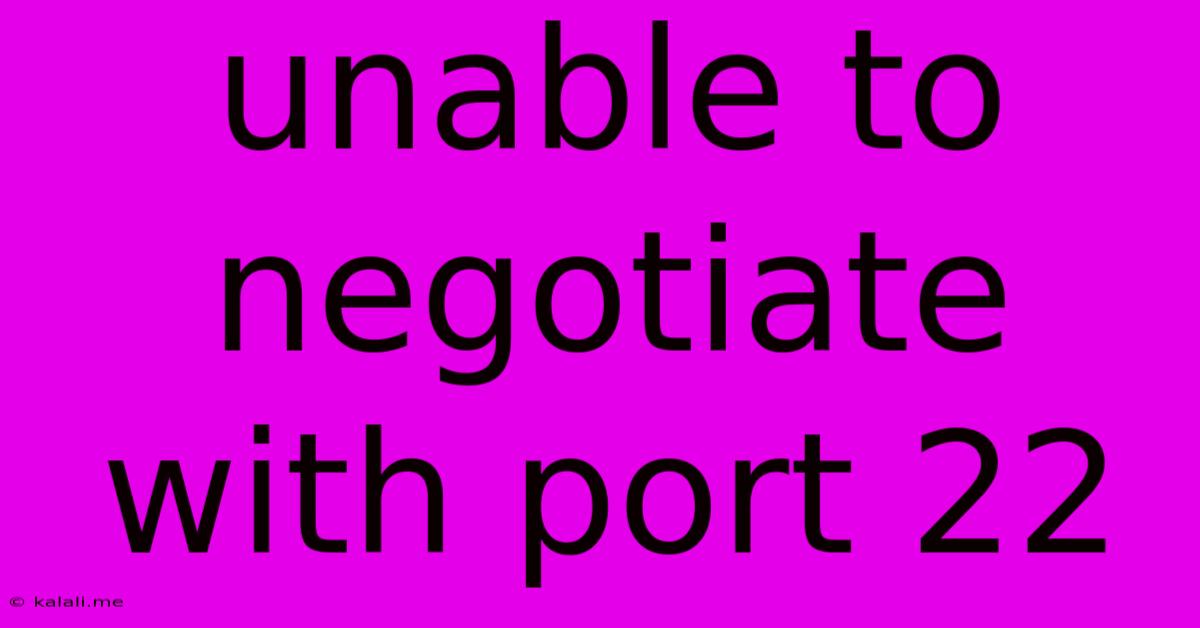Unable To Negotiate With Port 22
Kalali
May 25, 2025 · 3 min read

Table of Contents
Unable to Negotiate with Port 22: Troubleshooting SSH Connection Issues
Are you facing the frustrating "unable to negotiate with port 22" error message when trying to connect to your server via SSH? This common problem prevents you from accessing your remote machine, halting your workflow. This article will guide you through troubleshooting this issue, covering common causes and effective solutions. Understanding the underlying causes is crucial for a swift and effective resolution.
What causes the "unable to negotiate with port 22" error? This error typically indicates a problem with the SSH connection itself, often stemming from misconfigurations on either the client or server side. It signifies that the client and server can't agree on the encryption algorithms or authentication methods to establish a secure connection.
Common Causes and Solutions:
1. Firewall Issues:
- Problem: Firewalls, both on your local machine and on the server, can block port 22, preventing SSH connections.
- Solution:
- Check your local firewall: Temporarily disable your local firewall (Windows Firewall, macOS Firewall, etc.) to see if it's the culprit. If the connection works, configure your firewall to allow outgoing connections on port 22.
- Check your server's firewall: Access your server's firewall configuration (e.g.,
iptables,ufwon Linux) and ensure that port 22 is open for incoming SSH connections. Consult your server's documentation for specific instructions on configuring its firewall.
2. Incorrect SSH Server Configuration:
- Problem: The SSH server on your remote machine might be misconfigured, leading to incompatibility with your SSH client. This could involve incorrect settings for authentication methods, cipher suites, or key exchange algorithms.
- Solution:
- Check SSH server configuration files: Locate the SSH server configuration file (usually
/etc/ssh/sshd_configon Linux systems). Examine settings likeProtocol,Ciphers,MACs, andKexAlgorithms. Ensure they support algorithms compatible with your client. Consider simplifying these settings to more common and widely supported options if you're unsure. - Restart the SSH server: After making any changes to the configuration file, restart the SSH server to apply the changes. The command varies depending on your operating system (e.g.,
sudo systemctl restart sshon many Linux distributions).
- Check SSH server configuration files: Locate the SSH server configuration file (usually
3. SSH Client Issues:
- Problem: Your SSH client (e.g., PuTTY, OpenSSH) might have outdated settings or be incompatible with the server's configuration.
- Solution:
- Update your SSH client: Ensure your SSH client is up-to-date. Outdated clients may lack support for newer encryption algorithms used by the server.
- Check client settings: Review your SSH client's settings to ensure they are compatible with the server's configuration. Sometimes, explicitly setting certain cipher suites or key exchange algorithms in the client's configuration can help.
4. Network Connectivity Problems:
- Problem: Basic network connectivity issues can prevent SSH connections. This can include problems with your internet connection, DNS resolution, or routing.
- Solution:
- Check your internet connection: Ensure you have a stable internet connection.
- Verify server's IP address or hostname: Double-check that you're using the correct IP address or hostname for your server. Try using
pingto test connectivity to the server.
5. SSH Key Issues:
- Problem: If you're using SSH keys for authentication, ensure the private key is accessible and authorized on the server. Incorrect permissions or corrupted keys can cause connection problems.
- Solution:
- Check key permissions: Make sure the private key file has the correct permissions (usually
600). - Verify key authorization: Ensure the public key is added to the
authorized_keysfile on the server for the relevant user.
- Check key permissions: Make sure the private key file has the correct permissions (usually
6. Server Overload:
- Problem: A heavily loaded server might not be able to respond to new SSH connections.
- Solution: Investigate the server's resource utilization (CPU, memory, disk I/O). If it's overloaded, address the underlying performance issues.
By systematically investigating these potential causes, you should be able to pinpoint the source of the "unable to negotiate with port 22" error and restore your SSH connection. Remember to always back up your server's configuration files before making any significant changes. If you continue to experience difficulties after trying these solutions, consider seeking help from your server provider or consulting online resources specific to your operating system and SSH client.
Latest Posts
Latest Posts
-
How Many Inches Is A Meter Stick
Jul 10, 2025
-
Soundtrack To Step Up 2 The Streets
Jul 10, 2025
-
Keebler Club And Cheddar Crackers Expiration Date
Jul 10, 2025
-
In Many States Trailers With A Gvwr Of 1500
Jul 10, 2025
-
How Many Tablespoons Are In A Hidden Valley Ranch Packet
Jul 10, 2025
Related Post
Thank you for visiting our website which covers about Unable To Negotiate With Port 22 . We hope the information provided has been useful to you. Feel free to contact us if you have any questions or need further assistance. See you next time and don't miss to bookmark.